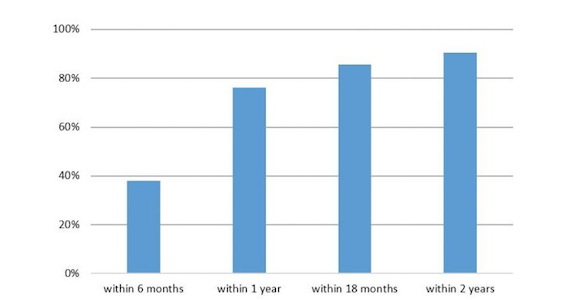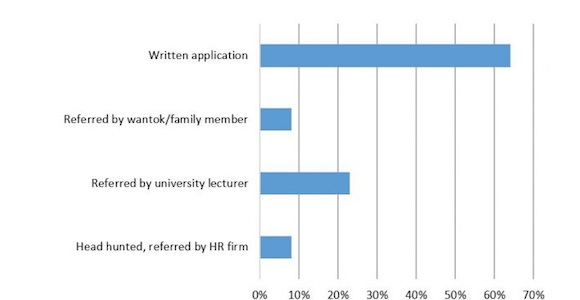In a slow economy getting jobs in the formal sector can prove difficult. But Rohan Fox, a Researcher at the Australian National University’s Crawford Policy Centre, says his research suggests that graduates of the University of Papua New Guinea do find employment.

Graduates of the University of Papua New Guinea. Source: Devpolicy
According to Bank of PNG data, there have been four years of decline in formal employment in PNG since 2013. Getting a first job is always hard, and a tough economic climate makes it even harder.
Consider the results of the latest of two surveys of the University of PNG (UPNG) economics class of 2015.
The first survey was conducted at the end of their final semester of classes and asked questions about their experience at UPNG and the desires for future work.
‘Most graduates who answered the survey were employed in the formal sector.’
This second survey, conducted in 2017, looked at the job-seeking process and employment outcomes.
Despite the economic climate, results from the cohort are generally strong, with the majority of graduates finding good positions within one year of graduating.

Employment over time (% of total participants). Source: Devpolicy
Formal and private sectors
Most graduates who answered the survey were employed in the formal sector. Of those, most graduates were employed in the private sector.
This is despite 58 per cent of graduates indicating in the prior 2015 survey that they sought careers in the public sector, and only 20 per cent indicating a preference for the private sector.
‘The majority secured their job through a written application.’
This could be partially reflective of the government salary and hiring freezes that hit just before these students graduated.
Nonetheless, all of the employers listed were high-profile, large organisations with strong reputations.
Those graduates not employed in the formal sector were either undertaking training, engaged in village duties, or working in the informal sector.

Method of securing job. Source: Devpolicy
Finding work
Between six and 12 months after graduation, most graduates had found work: 38 per cent within six months, a further 38 per cent within one year of graduation, a further 10 per cent within 18 months, and a further 5 per cent within two years.
The majority secured their job through a written application, while the rest were referred by various contacts, wantoks (relatives and friends), lecturers, or HR firms.
‘Employment results are, as far as we can tell, positive.’
Of those who secured a position, the vast majority submitted five or fewer applications for jobs before they were offered their current job.
Notably, not all jobs related to economics.

Number of applications before securing current job. Source: Devpolicy
Relevance
Graduates were also asked to name the courses they studied at UPNG that were most relevant to their current job.
The highest ranked course by broad applicability on average was statistics, while the lower ranked courses were much more specialised – like agricultural economics and environmental economics. These courses may be useful to a small number of specialised workplaces.
Employment results are, as far as we can tell, positive. Despite harsh economic conditions, the majority of graduates found jobs within one year of graduation.
These graduates are arguably some of the most employable entrants into the workforce in PNG, so we would hope that the results are strong.
— This story first appeared in devpolicy.









Speak Your Mind